Have you ever wondered why your cat insists on following you to bed? It’s a behavior that many cat owners experience. Cats have unique relationships with their human caretakers, often forming genuine bonds and showing interest in their activities. This behavior may manifest in following their owners around the house, including into the bedroom at bedtime. But why do they do it? Let’s dive into the fascinating world of cat behavior and explore the reasons behind this intriguing habit.
Key Takeaways:
- Cats follow their owners to bed to seek companionship and continue their bond.
- They may be seeking attention, affection, or playtime.
- Cats are curious creatures and enjoy exploring interesting scents and environments.
- Following their owners to bed can be a way for cats to communicate their emotions or needs.
- Cats find comfort, security, and warmth in sleeping with their owners.
The Bond Between Cats and Humans
Cats have been living with humans for centuries, forming a unique bond that is unlike any other. As a cat owner, you may have noticed that your feline companion enjoys spending time with you, following you around the house and even into the bedroom at bedtime. This behavior is a testament to the strong bond between cats and their human companions.
When a cat follows you to bed, it is a sign of their desire for companionship and closeness. They see you as their favorite person and want to continue the bond into the night. Your presence provides them with comfort, security, and a sense of belonging.
This cat-human bond is built on trust, love, and mutual understanding. Cats are known for their independent nature, but they still seek the company of their human caretakers. Sleeping together creates a deeper connection and strengthens the bond between you and your feline friend.
| Benefits of the Cat-Human Bond |
|---|
| 1. Emotional support and companionship |
| 2. Reduced stress and anxiety |
| 3. Improved sleep quality for both human and cat |
| 4. Increased feelings of happiness and contentment |
The cat-human bond is a unique relationship that brings joy and fulfillment to both parties. It is a testament to the incredible connection that can be formed between humans and animals.
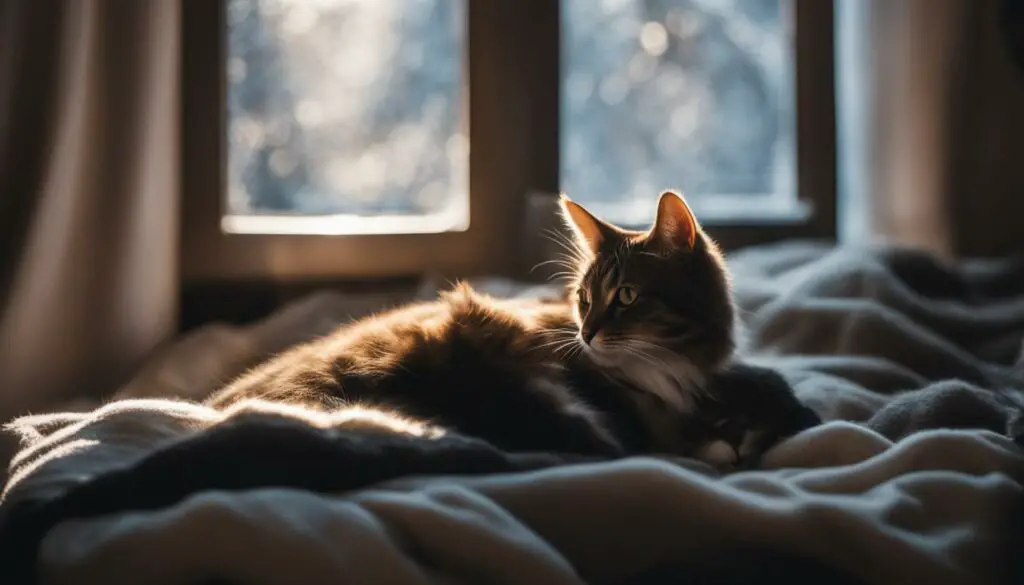
The Importance of Feline Companionship
Feline companionship is a valuable and enriching experience. Cats provide unconditional love, companionship, and emotional support to their owners. They can help reduce stress, improve mental well-being, and bring joy and laughter into our lives. The bond between cats and humans is a special one that should be cherished and nurtured.
Seeking Attention and Affection
Understanding cat behavior is essential for building a strong bond with your feline companion. One of the reasons why cats follow their owners to bed is to seek attention and affection. Like dogs, cats thrive on human interaction and enjoy being the center of attention. If you’ve had a busy day and haven’t been able to give your cat the attention they crave, they may choose to follow you to bed as a way to seek your undivided affection.
Cats are highly intuitive creatures and can sense when their owners are emotionally distant or preoccupied. By following you to bed, they are signaling their need for love, affection, and playtime. Taking the time to pet and engage with your cat before bedtime not only fulfills their emotional needs but also helps create a deeper bond between you and your furry friend.
When I come home from work, my cat always follows me to bed. I think she just wants some cuddle time and a chance to play. It’s our special bonding moment before we drift off to sleep.”
Meeting your cat’s needs for attention and affection is crucial for their overall well-being. Regular play sessions, grooming, and quality time spent together can help prevent behavioral issues and ensure a happy, contented cat. By understanding your cat’s behavior and responding to their needs, you can create a loving and harmonious relationship that extends beyond the bedroom.

Exploring Interesting Scents and Environments
One of the reasons why your cat follows you to bed could be their natural curiosity and desire to explore interesting scents and environments. Cats are known for their keen sense of smell, and they are often fascinated by new smells and objects. By following you into the bedroom, they can satisfy their curiosity and engage in playful behavior.
This behavior is driven by their innate need for mental stimulation and exploration. Cats are natural hunters, and even in a domestic setting, they still retain their instincts to explore their surroundings. So, when they see you heading towards the bedroom, they see it as an opportunity to discover new scents and objects that may have been brought into the room.
It’s important to provide your cat with adequate mental and physical stimulation throughout the day to prevent excessive curiosity-driven behavior. Interactive toys, scratching posts, and regular play sessions can help keep your cat stimulated and satisfied. Additionally, providing a dedicated space for exploration, such as a cat tree or puzzle toys, can give them an outlet for their natural curiosity.

Table: Common Items that Entice Cats’ Curiosity in the Bedroom
| Item | Description |
|---|---|
| Laundry | The smell of freshly laundered clothes can be intriguing to cats. |
| Books or magazines | The texture and smell of paper can attract cats‘ attention. |
| Electronics | Cats may be drawn to the warmth and hum of electronic devices. |
| Plants | Cats may be curious about the textures and scents of indoor plants. |
| Pets’ belongings | The scent of other pets can pique your cat’s interest. |
“My cat always follows me into the bedroom and starts sniffing around. I had to make sure to cat-proof the room and remove any small objects that he might find interesting.” – Cat owner
The Language of Cats: Understanding their Behavior through Body Language
When it comes to cats, understanding their behavior is essential for building a strong bond with our feline friends. While cats may not communicate with words like humans do, they have a rich and nuanced language of their own, expressed through body language. By learning to interpret their movements and behaviors, we can gain valuable insights into their emotions and needs.
Cats use a combination of subtle cues and overt gestures to express themselves. For example, a cat with raised fur and an arched back is displaying signs of fear or aggression, while a relaxed, slightly curled tail indicates contentment. By observing these nonverbal cues, we can better understand how cats are feeling in different situations and respond appropriately.
It’s important to note that body language can vary between individual cats, so it’s essential to take into account their unique personalities and previous experiences. Building a strong bond and trust with your cat is crucial for accurate interpretation of their body language. By spending quality time together and providing a safe and nurturing environment, you can develop a deep understanding of your cat’s behavior and strengthen your connection.
Common Body Language Cues in Cats
| Cue | Meaning |
|---|---|
| Slow Blinking | An expression of trust and relaxation. |
| Purring | Signifies contentment and comfort. |
| Ears Flat Back | Indicates fear, aggression, or anxiety. |
| Tail Twitching | Shows excitement or anticipation. |
By familiarizing yourself with these common body language cues, you can enhance your ability to understand your cat’s needs and emotions. Remember, every cat is unique, so taking the time to observe and learn their individual signals is key to building a meaningful and fulfilling relationship.
In Conclusion
Understanding cat behavior is a fascinating journey that allows us to deepen our connection with these enigmatic creatures. By paying attention to their body language and providing a safe and loving environment, we can create a strong bond based on trust and understanding. So next time your cat communicates with you through their body language, take a moment to appreciate the subtle nuances and respond accordingly. Your cat will thank you with purrs and affectionate gestures, fostering a lifelong friendship.
Seeking Security and Warmth
Cats are creatures of habit and seek comfort and security in their sleeping arrangements. By following their owners to bed, cats can feel safe and protected, as well as benefit from the warmth generated by human body heat. The feeling of closeness and security helps them relax and ensures a restful sleep.
Research has shown that cats are sensitive to temperature and prefer warmer environments for sleeping. They have a higher body temperature than humans, typically ranging from 100.5 to 102.5 degrees Fahrenheit. By snuggling up next to their owners, cats can regulate their body temperature more effectively and enjoy the cozy warmth provided by their human companions.
In addition to warmth, sleeping with their owners provides cats with a sense of security. Cats are instinctively territorial and prone to anxiety, especially when they are alone. Being close to their human companions in the bedroom helps alleviate this anxiety, as they feel protected and less vulnerable to potential threats. The familiar scent and presence of their owner provide reassurance and a comforting environment that promotes relaxation and a deep sense of security.
So, when your cat follows you to bed, it’s not just a desire for closeness or attention, but also a natural instinct to seek warmth and security. By sharing your sleeping space with your feline friend, you create a safe and comforting routine that enhances their well-being and strengthens the bond between you.
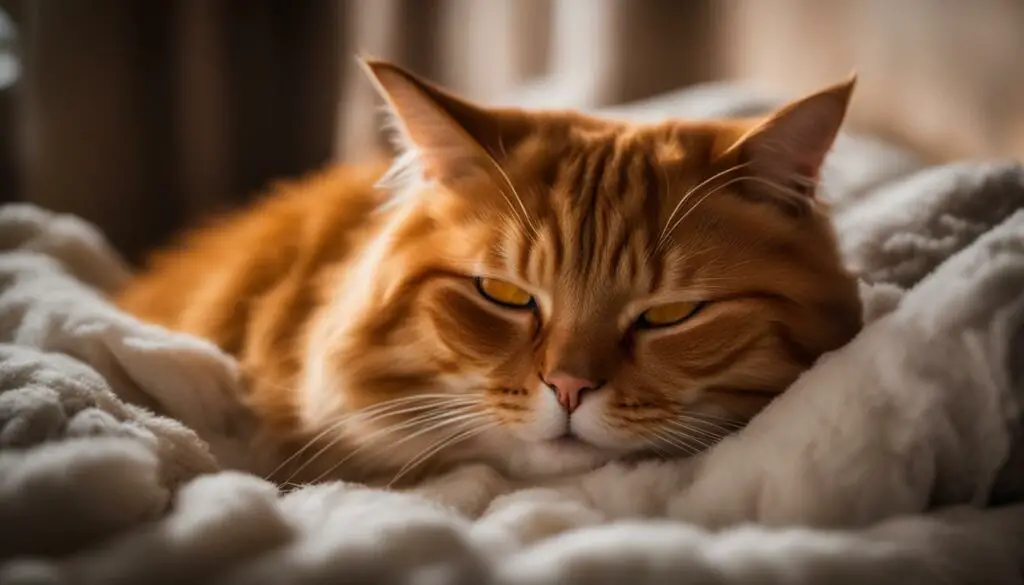
Table: Benefits of Cat Sleeping Patterns and Routines
| Benefits | Description |
|---|---|
| Improved sleep quality | Cats’ rhythmic breathing and comforting presence can promote relaxation and better sleep for their owners. |
| Reduced stress and anxiety | The warmth and security provided by a sleeping cat can help alleviate stress and anxiety, promoting a calm and peaceful environment. |
| Enhanced bond and companionship | Sharing sleeping space with your cat strengthens the bond between you and deepens the sense of companionship and trust. |
| Regulated body temperature | Cats benefit from the warmth generated by human body heat, helping them regulate their body temperature and ensuring a comfortable sleep. |
| Reduced loneliness | For both cats and humans, sleeping together provides a sense of companionship and reduces feelings of loneliness, especially during quiet nights. |
Marking Territory and Establishing Ownership
One of the reasons why cats may choose to follow their owners to bed is to mark their territory and establish ownership. Cats have a strong territorial instinct, and by leaving their scent on their owners, they communicate to other animals that this person is part of their territory. This behavior also serves to reinforce the bond between cat and owner, as the cat sees the owner as a valuable and trusted companion.
When a cat sleeps on or near their owner, they are essentially marking their human as belonging to them. This marking behavior can be seen as a sign of ownership and a way for the cat to assert their presence and dominance in their shared environment. It is a natural instinct for cats and is rooted in their primal need to protect their resources and establish their territory.
By sleeping next to their owner, cats also display their trust and comfort in their human companion. They feel safe and secure in the presence of their owner and find comfort in the familiar scent and warmth. This behavior further strengthens the bond between cat and owner, creating a sense of mutual affection and understanding.
In conclusion, while cats may follow their owners to bed for various reasons, marking territory and establishing ownership is one significant factor. This behavior allows cats to assert their dominance, communicate their ownership, and strengthen their bond with their human companions. It is a natural and instinctual behavior for cats that further highlights the unique and complex nature of feline behavior.
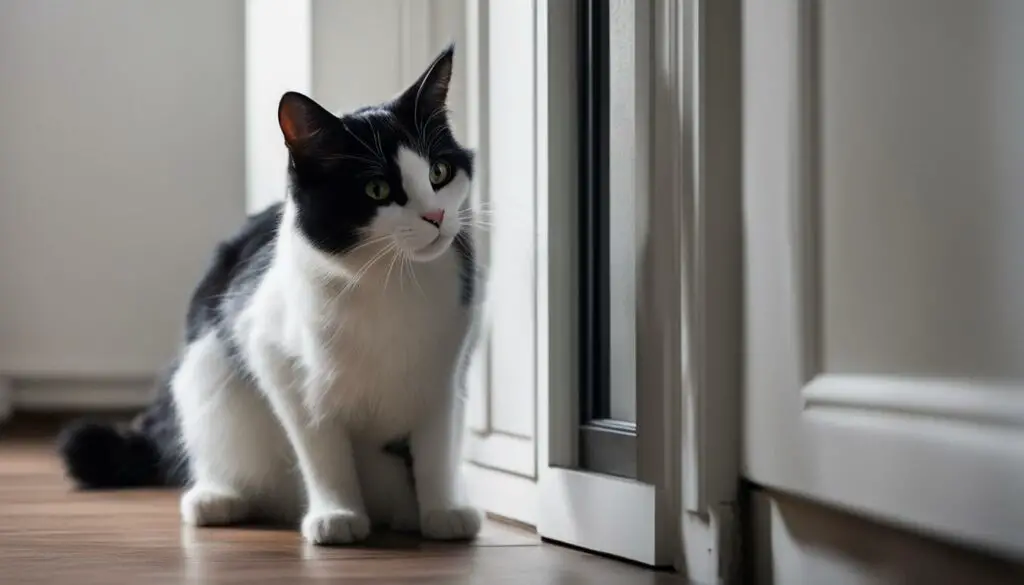
Missing their Human Companion
One of the main reasons why cats follow their owners to bed is because they miss their human companions. Cats form strong emotional attachments to their caretakers and can experience separation anxiety when they are away for extended periods. When you return home after being away, your cat may seek closeness and comfort by following you to bed. This behavior is a testament to the deep emotional bond that cats share with their owners.
It’s important to understand that cats are social animals, and they rely on their human companions for love, attention, and companionship. By following you to bed, they are seeking the physical and emotional closeness that they may have missed while you were away. This behavior shows their desire to reconnect and reinforces the strong bond between you and your feline friend.
If your cat consistently follows you to bed after you’ve been away, it’s a good idea to take some time to reconnect and reassure them of your presence. Spend quality time together, engage in interactive play sessions, and provide plenty of affection to help them feel secure and loved. This will not only strengthen your bond but also ensure a happy and contented cat.
Quotable:
“Cats follow their owners to bed as a way of seeking closeness and making up for the time spent apart. It’s a reflection of the deep emotional connection they share with their human companions.” – [Your Name]
| Reasons for Cats Following Owners to Bed | Explanation |
|---|---|
| Missing their Human Companion | Cats experience separation anxiety and seek closeness upon their owner’s return. |
| Seeking Attention and Affection | Cats follow their owners to bed to seek attention, love, and interaction. |
| Seeking Security and Warmth | Cats find comfort, security, and warmth by sleeping close to their owners. |
| Exploring Interesting Scents and Environments | Cats are naturally curious and follow their owners to bed to explore new scents and environments. |
| Communication Through Body Language | Cats may stay close to their owners during sleep as a way to communicate their emotions or needs. |
| Marking Territory and Establishing Ownership | Cats mark their owners as part of their territory and deepen the bond by sleeping with them. |
Image source: https://seo writing.ai/32_6.png
It’s a Familiar and Comforting Routine
Allowing your cat to sleep with you can create a familiar and comforting routine for both of you. Cats thrive on routines and familiarity, and sharing a bed with their owner can quickly become a predictable and enjoyable part of their daily routine. The sense of security and closeness that comes from sleeping next to their trusted human can help your cat feel safe and content.
When your cat sleeps with you, they benefit from the warmth generated by your body heat, which can provide additional comfort and relaxation. The feeling of closeness and physical contact can help reduce stress and anxiety in both you and your cat, promoting better sleep quality for both parties involved.
It’s important to note that this routine may not be suitable for everyone. Some individuals may prefer to have their personal sleeping space, or they may have allergies that make sleeping with a cat problematic. It’s essential to consider your own sleep habits and comfort level before allowing your cat to sleep with you. If you decide that sharing a bed is not the right choice for you, there are still many other ways to bond and strengthen your relationship with your cat.
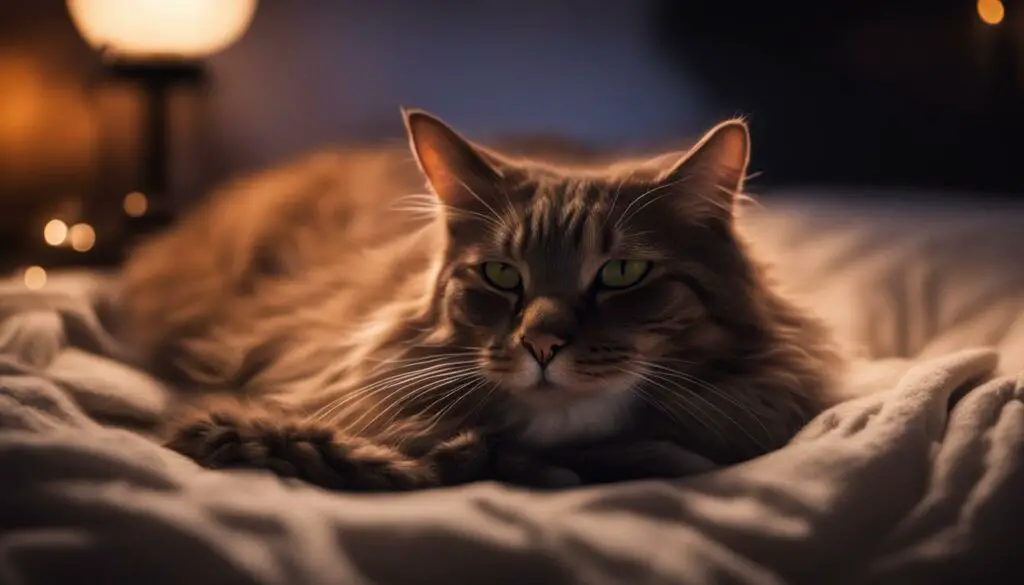
The Importance of Safety When Sleeping with Your Cat
When considering whether to allow your cat to sleep with you, it’s important to prioritize safety. While there are many benefits to sharing your bed with your feline companion, certain precautions should be taken to ensure a healthy and safe sleeping environment for both you and your cat.
Table: Safety Considerations for Sleeping with Cats
| Consideration | Description |
|---|---|
| Parasites and Illnesses | If your cat spends time outdoors, they may be exposed to parasites or illnesses that can be transmitted to humans. Regular veterinary check-ups, vaccinations, and parasite prevention can help minimize this risk. |
| Allergies | If you have allergies to cats, sharing your bed with them may worsen your symptoms. It’s important to consider your own health and comfort before making the decision to sleep with your cat. |
Keeping your cat clean and free of fleas and ticks is essential to prevent infestations and minimize the risk of disease transmission. Regular grooming can help maintain their hygiene and reduce allergens in your sleeping area. Additionally, you may want to consider purchasing a hypoallergenic mattress cover or using allergy-friendly bedding to help mitigate any allergic reactions.
By being mindful of these safety considerations and taking necessary precautions, you can create a safe environment for both you and your cat to enjoy the companionship of sleep. Remember, it’s always best to consult with your veterinarian if you have any specific concerns or questions regarding your cat’s health or behavior.
The Benefits of Sleeping with Your Cat
Sleeping with your cat can be a delightful experience that offers numerous benefits for both you and your furry companion. The close proximity and physical contact create a sense of comfort and relaxation, helping you unwind and promoting better sleep. The sound of your cat’s gentle purring can be incredibly soothing, providing a soothing soundtrack to your slumber.
The bond between you and your cat is strengthened through the intimacy of sharing a sleeping space. It fosters a sense of trust and companionship, deepening the emotional connection between you and your feline friend. Having your cat sleep with you can be a source of comfort and reassurance, especially during times of stress or anxiety.
Moreover, the benefits extend beyond the emotional sphere. Sharing your bed with your cat can provide warmth, as cats are naturally drawn to the body heat humans generate. This cozy environment can be particularly beneficial during colder months or for cats with shorter fur. Additionally, having your cat close by can provide a sense of security, both for them and for you, knowing that you are mutually protecting and watching over each other.
The Psychological and Health Benefits
The psychological benefits of sleeping with your cat are numerous. It has been shown to reduce feelings of loneliness and depression, as cats provide companionship and a sense of purpose. The physical contact and relaxation of sleeping together can also lower blood pressure and decrease stress levels. In fact, studies have shown that petting a cat can release endorphins, which contribute to a sense of calm and well-being.
| Psychological Benefits | Health Benefits |
|---|---|
| – Decreased feelings of loneliness and depression | – Lowered blood pressure |
| – Enhanced sense of companionship and purpose | – Reduced stress levels |
| – Release of endorphins, promoting calmness | – Improved sleep quality |
It is important to note that the benefits of sleeping with your cat may vary depending on your individual circumstances and sleeping preferences. Some people may find it difficult to sleep with a cat, especially if they are light sleepers or have allergies. In such cases, alternative ways of bonding and spending quality time with your cat can still be explored to ensure a strong and fulfilling relationship.
“Sleeping with my cat brings me a sense of peace and contentment. It’s like having a warm and loving presence next to me, and I always wake up feeling refreshed. It’s a special connection that I cherish.”
Potential Challenges of Sleeping with Your Cat
Sleeping with your cat can be a wonderful experience, but it’s important to be aware of the potential challenges that may arise. Understanding these challenges can help you make an informed decision about whether sharing your bed with your feline friend is the right choice for you.
Disrupted sleep patterns
One of the main challenges of sleeping with a cat is the potential for disrupted sleep patterns. Cats are nocturnal animals, and their natural instincts may lead them to be active at night. They may pounce, play, or even vocalize, which can disturb your sleep and leave you feeling tired the next day. If you are a light sleeper or require uninterrupted rest, sleeping with your cat may not be the best option.
Hygiene concerns
Another challenge to consider is the potential for hygiene concerns. Cats have a knack for finding and tracking dirt, debris, or litter into the bed. This can be unpleasant and may require extra cleaning or laundering of bedding. Additionally, some cats may groom themselves while on the bed, which can lead to shedding or the transfer of allergens. If you have allergies or prefer to keep your sleeping area pristine, you might want to reconsider sharing your bed with your cat.
Uncomfortable sleeping positions and space
Cats have a way of finding the most comfortable sleeping positions for themselves, which may not always align with your own preferences. They may choose to sleep on top of you, sprawled out across the bed, or in any other unconventional position that suits them. This can sometimes leave you feeling cramped or uncomfortable, especially if your cat takes up a significant amount of space. If you value your own comfort during sleep, it may be worth considering alternative sleeping arrangements for your cat.
While these challenges should be taken into account, it’s important to remember that every cat and sleep experience is unique. Some cat owners find sleeping with their feline companions to be a rewarding and comforting experience, despite the potential challenges. Ultimately, the decision of whether to sleep with your cat is a personal one, based on your own preferences and circumstances. If you do choose to share your bed, it’s important to establish boundaries and create a sleep environment that is comfortable for both you and your cat.
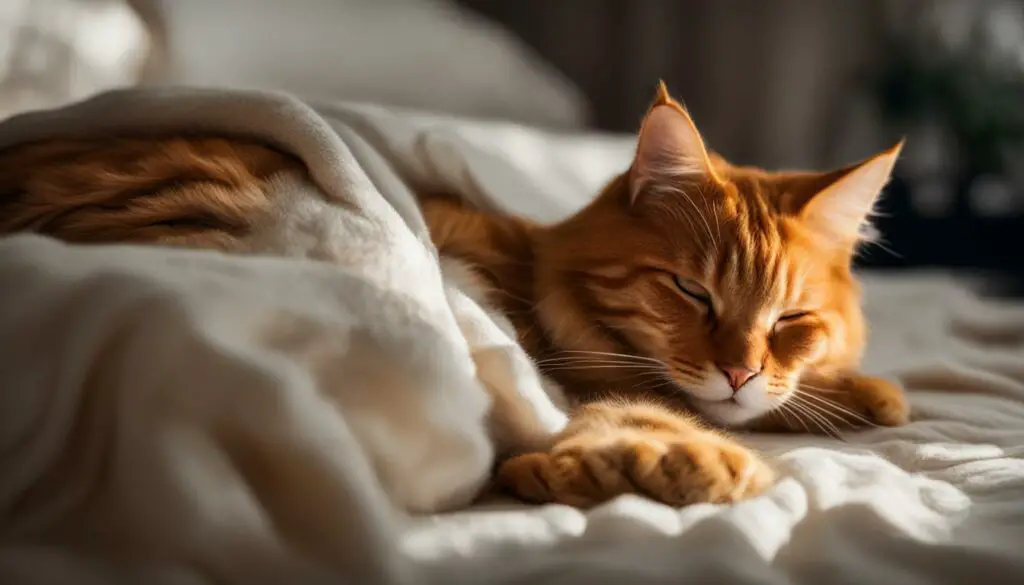
To Sleep or Not to Sleep with Your Cat
When it comes to letting your feline friend sleep in your bed, the decision is a personal one. It’s important to consider your own sleeping habits and comfort level, as well as your cat’s behavior and health. While some cat owners enjoy the warmth and companionship that comes with sharing a bed with their feline companion, others prefer to have their own sleeping space. Either way, there are alternative ways to bond with your cat and ensure a strong and fulfilling relationship.
If you decide not to let your cat sleep in your bed, there are numerous other activities you can engage in to strengthen the bond with your furry friend. Regular play sessions, grooming, and establishing a feeding routine can all contribute to a deeper connection. These activities not only promote bonding, but also contribute to your cat’s overall well-being and happiness.
On the other hand, if you choose to let your cat sleep with you, it’s important to consider any potential challenges. Cats may be restless or active during the night, which can disrupt your sleep. They may also track dirt or debris into the bed, causing hygiene concerns. Additionally, cats may unintentionally cause discomfort by choosing unconventional sleeping positions or taking up too much space. It’s important to weigh the pros and cons and determine what works best for you and your cat.
Alternative Ways to Bond with Your Cat
If sharing your bed with your cat isn’t your preference, there are plenty of other ways to strengthen the bond between you and your feline companion:
- Engage in daily play sessions to provide mental and physical stimulation.
- Establish a grooming routine to keep your cat’s coat healthy and bond through gentle brushing.
- Set aside regular feeding times to create a routine and develop trust.
By engaging in these activities, you can foster a deeper connection with your cat and ensure a strong and fulfilling relationship, even if you choose not to share your bed.
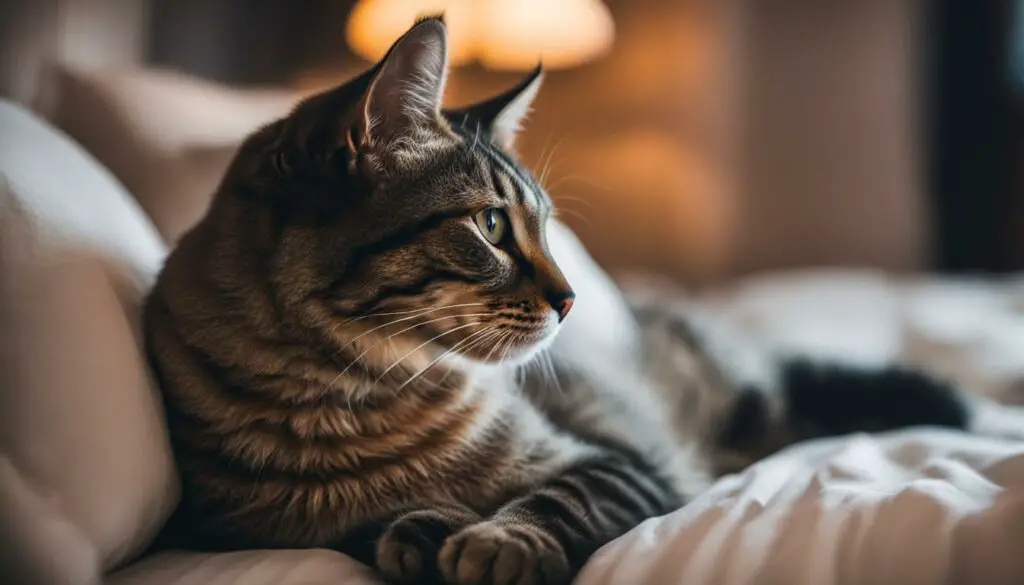
Bonding with Your Cat in Other Ways
If sleeping with your cat is not your preference, there are numerous other ways to strengthen the bond with your feline companion. Engage in daily play sessions, provide regular grooming, and establish a feeding routine to foster a deeper connection. These activities not only promote bonding but also contribute to your cat’s overall well-being.
Play sessions are a great way to interact with your cat and stimulate their natural hunting instincts. Use interactive toys such as feather wands or laser pointers to engage them in active play. This not only keeps them physically active but also provides mental stimulation, preventing boredom and behavioral issues.
Regular grooming sessions are not only beneficial for your cat’s physical health but also provide an opportunity for bonding. Use a soft brush to gently groom their fur, helping to remove loose hair and prevent matting. The act of grooming can be calming for both you and your cat, creating a sense of trust and relaxation.
Establishing a consistent feeding routine can also strengthen the bond between you and your cat. Cats appreciate routine and knowing when and where their meals will be served. Take time to prepare their meals and feed them at the same time every day. This regular interaction around mealtime can create a sense of security and familiarity, deepening your cat’s trust in you.
| Activities for Bonding with Your Cat | Description |
|---|---|
| Daily Play Sessions | Engage in interactive play with toys that stimulate your cat’s hunting instincts. |
| Regular Grooming | Use a soft brush to groom your cat’s fur, promoting relaxation and trust. |
| Establishing a Feeding Routine | Feed your cat at the same time every day to create a sense of security and familiarity. |
By incorporating these activities into your daily routine, you can build a strong bond with your cat and provide them with the love and attention they desire. Remember, each cat is unique, so pay attention to their individual preferences and adjust your interactions accordingly. Building a strong and trusting relationship with your feline companion will bring joy and fulfillment to both of your lives.
Embrace the Sweet Cat Moments
Sharing your sleeping space with a beloved feline companion can bring about moments of pure joy and warmth. The sweet cat moments that occur during these times can be incredibly special, solidifying the bond between you and your cat. Whether they curl up next to you, purr softly, or gently nudge you for attention, these moments showcase the unique connection you share. It’s a reminder of the feline companionship that brings comfort and happiness to your life.
During these sweet cat moments, take the time to appreciate the love and trust that your cat shows you. Cherish the quiet coziness, the shared warmth, and the gentle presence that brings a sense of calm to your sleeping routine. It is in these moments that you truly understand the depth of the cat-human bond and the joy that comes from having a feline friend by your side.
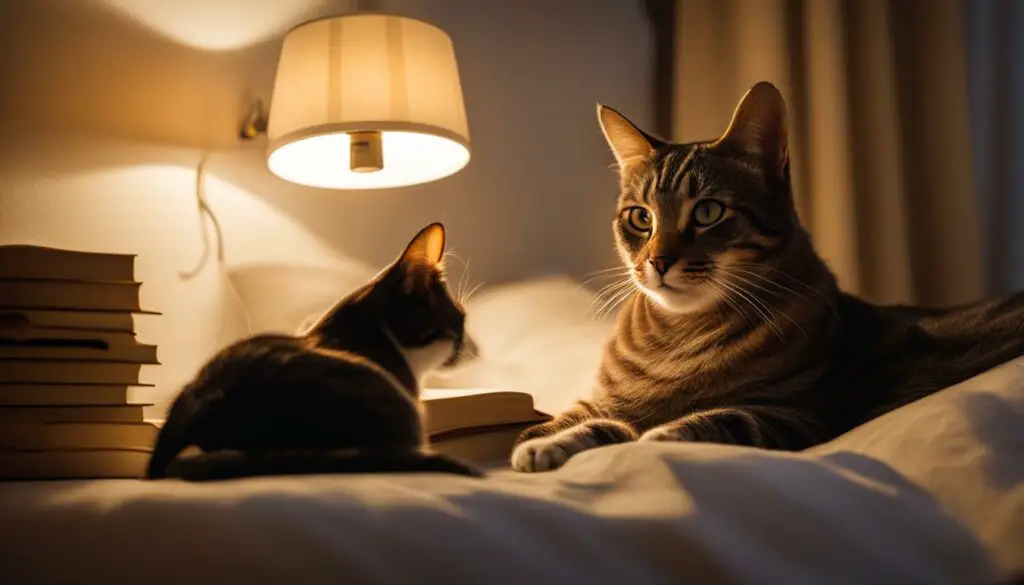
Every cat’s presence in your life is unique, and their companionship can enrich your everyday experiences. Whether they purr softly as they settle in or playfully knead before finding their perfect sleeping spot, these little gestures bring a sense of comfort and contentment. Embrace these sweet cat moments and appreciate the love and friendship that your feline companion brings into your life.
Conclusion
Understanding cat behavior is a fascinating journey into the depths of feline psychology. From seeking warmth and security to marking territory and showing affection, cats have various reasons for choosing to sleep by their owners. By recognizing and embracing these behaviors, we can deepen our understanding of our furry companions and strengthen our bond with them.
Through their actions, cats communicate their needs and desires, whether it’s seeking attention and affection, exploring interesting scents and environments, or simply following their natural instincts. By taking the time to understand and respond to these behaviors, we can foster a deep sense of connection and mutual understanding.
By nurturing the bond with our cats, we not only enhance our own lives but also contribute to their overall well-being. Whether we choose to share our bed with them or find alternative ways to bond, such as daily play sessions or regular grooming, the love and companionship they provide are truly invaluable.
So, let’s continue to learn, observe, and cherish the special moments we share with our feline friends. By understanding their behavior and psychology, we can create a harmonious and fulfilling relationship that brings joy to both our lives and theirs.
FAQ
Why does my cat follow me to bed?
Cats have unique relationships with their human caretakers and often form genuine bonds. They may follow their owners to bed as a way to continue the bond and seek companionship during the night.
Can my cat be following me to bed for attention?
Yes, cats thrive on attention and affection from their owners. If they feel neglected during the day, they may follow you to bed to seek attention, petting, or playtime.
Why does my cat follow me into different rooms, including the bedroom?
Cats are naturally curious creatures and are attracted to interesting smells and environments. They may follow you to different rooms, including the bedroom, to explore new scents, investigate objects, and engage in playful behavior.
Is it normal for my cat to follow me to bed when they are feeling unwell or stressed?
Yes, cats communicate through body language, and following their owners to bed can be a way of expressing their emotions or needs. If a cat is feeling unwell or stressed, they may intensify their behaviors, including staying close to their owner.
Why does my cat want to sleep with me?
Cats seek comfort and security in their sleeping arrangements. By sleeping with their owners, cats can feel safe, protected, and benefit from the warmth generated by human body heat.
Is it normal for my cat to sleep on or near me to mark their territory?
Yes, cats have a strong territorial instinct, and sleeping on or near their owners can be a way of marking their territory. This behavior also reinforces the bond between cat and owner.
Why does my cat follow me to bed after I have been away?
Cats can experience separation anxiety when their owners are away for extended periods. Following their owners to bed upon their return is a way of seeking closeness and making up for the time apart.
Can allowing my cat to sleep with me become a routine for them?
Yes, cats thrive on routines and familiarity. Allowing your cat to sleep with you can quickly become a comforting and predictable routine for them, providing a sense of security and familiarity.
Is it safe for my cat to sleep with me?
Generally, sleeping with your cat is safe as long as the cat is clean and free of any illnesses. However, there may be considerations regarding exposure to parasites or allergies for some individuals.
What are the benefits of sleeping with my cat?
Sleeping with your cat can provide comfort and companionship, helping you relax and sleep better. It also strengthens the bond between you and your cat, deepening the sense of companionship and mutual trust.
What are the potential challenges of sleeping with my cat?
Cats may be restless or active during the night, disrupting your sleep. They may also track dirt or debris into the bed. Additionally, cats may unintentionally cause discomfort by choosing unconventional sleeping positions or taking up too much space.
Is it necessary to sleep with my cat to bond with them?
No, sleeping with your cat is a personal decision. There are numerous other ways to strengthen the bond, such as engaging in daily play sessions, providing regular grooming, and establishing a feeding routine.
How can I bond with my cat in other ways?
You can bond with your cat through activities such as play sessions, grooming, and establishing routines. These activities promote bonding and contribute to your cat’s overall well-being.
Should I cherish the moments and bond I have with my cat?
Absolutely! Cherish the special moments and the unique bond you share with your feline friend. The comfort, companionship, and love that cats provide are truly precious.
Why is it important to understand my cat’s behavior?
Understanding cat behavior helps strengthen the bond between cat and owner and fosters a deeper connection. It also enables you to address any concerns or issues that may arise.
Source Links
- https://spotpetins.com/blog/cat-tips/why-does-my-cat-sleep-next-to-me
- https://www.dailypaws.com/cats-kittens/behavior/common-cat-behaviors/why-does-my-cat-follow-me-everywhere
- https://www.pawtracks.com/cats/why-cats-sleep-with-you/








